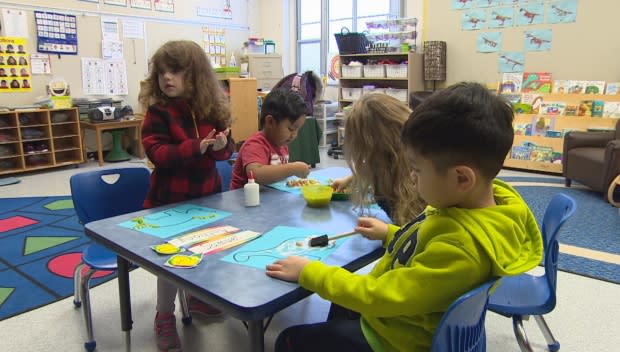It's all about choice, education minister says of pre-K plan
Quebec Education Minister Jean-François Roberge is not backing down from his plan to offer kindergarten to four-year-olds across the province.
The promise of universal pre-K featured heavily in the Coalition Avenir Québec's election campaign. That promise came closer to becoming reality on Thursday when the government tabled Bill 5, which would amend Quebec's Education Act so that "all children having reached four years of age will be entitled to preschool education services."
Here's what the minister had to say about his plan with CBC Montreal's Daybreak host Sabrina Marandola.
On the cost of universal pre-K
The government says universal pre-K would come with an annual price tag of $400 million to $700 million.
But Roberge says the cost won't be that high right away. He estimates that the first year of the program, planned to begin in September, would cost $30 million to $40 million.
"We will start in the regions, and we will invest in our infrastructures, and within five years we're pretty confident that we will be able to give the choice [for] all the parents," he said.
Complicating matters is a varying number of teachers and classroom space available across the province.
"In Montreal, it's more difficult," said Roberge, blaming previous governments for not investing enough in the city's educational infrastructure.

On the number of students in pre-K
Kindergarten for four-year-olds is currently offered to areas considered low-income, with the ministry saying about 5,000 students are enrolled across the province.
For September 2019, Roberge says there will be an additional 250 pre-K classes. He said the location of the classes were chosen based on the staffing and capacity in the province's school boards.
Of those 250 classes, 36 will be on the island of Montreal. Those Montreal classes will mostly be part of the English school boards, he said.
"As long as the classes are full, we will open more and more classes. We will go with the demand, we will go with the parents, we will listen to the parents."
"Right now, the surveys are telling us that around 20 per cent of parents of four-year-old kids would enjoy to have the choice, and will choose kindergarten," said Robege.
He says he expects that proportion to rise as parents learn more about the program.
On the difference between pre-K and subsidized daycare
"We won't force anybody [to attend]. We want to offer the choice. This is not a problem, this is a solution," he said.
He said the pre-K classes will have access to professionals with expertise in working with special-needs students.
"With the CAQ government, we will hire more and more and more professionals," he said. The ministry is looking to hire a "huge team" to support students with disabilities.
"A lot of professionals left the public system through the years because in fact Liberal and PQ governments didn't invest in our education system. We will invest, we will give them better conditions and we are confident that they will go back in the public system," he said.
A petition submitted to the National Assembly against the plan has more than 20,000 signatures and has the support of Quebec's three opposition parties.
Roberge said that critics should be focused on other problems with the education system, like the dropout rate.
"We will continue investing in the CPEs, we will continue developing the CPEs, so I think they will be pleased with this policy," he said.
"We will give the choice to the parents, and nobody will lose anything if we give the choice to the parents."

